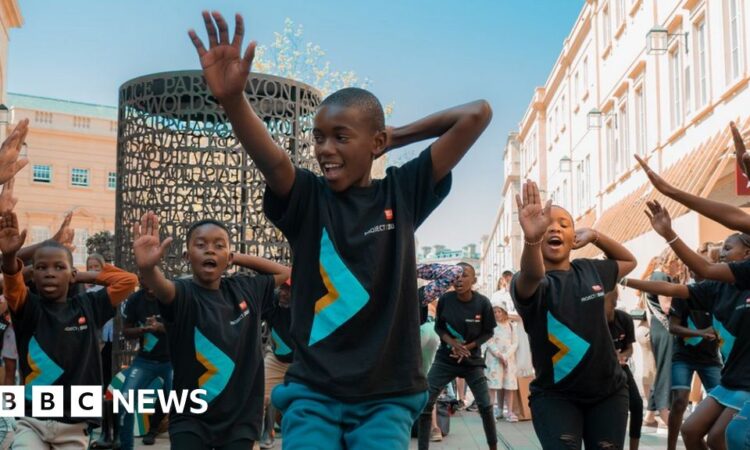
Image source, Rachel Oakes
The choir performed traditional Zulu songs and dances at Southgate Place, Bath
A children’s choir from South Africa has arrived in the UK for a three week tour and cultural exchange.
Project Zulu is an initiative run by the University of the West of England (UWE), which works in partnership with South African township schools.
The choir’s first performance was in Bath on 27 May, where they raised £1,600 in less than an hour.
The money will go towards building new classrooms across two schools in the township of Madadeni.
Image source, Rachel Oakes
The choir will visit eight schools in and around Bristol
The choir of nine boys and 11 girls are from the Madadeni Township in Newcastle, KwaZulu-Natal, South Africa.
They attend the Mntimande Primary and Jobstown Primary schools.
UWE staff and students volunteered at both schools in February, to help support educational development projects.
Image source, Rachel Oakes
Image source, Racehl Oakes
Both schools currently have more than 60 pupils per classroom making effective learning a challenge, said Ben Knight, Project Zulu founder and senior lecturer at UWE.
Mr Knight said: “There’s no doubt the choir’s extraordinary musical talent will draw in the crowds, but the tour’s success is also vital to the ongoing development of all the children’s schools and their education.”
Image source, Rachel Oakes
Children performing at Clifton College recording studios
It is the first time the children have travelled abroad and they are staying with host families in Bristol.
Sinaye Phakathi, choir member from Jobstown Primary School said she enjoys singing in the choir because it makes her feel comfortable and gives her hope.
“My favourite song is “Ngiyakuthanda Jesu” (I love you Jesus),” she added.
Image source, Rachel Oakes
Ndomiso Zungu works at Mntimande Primary School and said the choir is excited to show Bristol its culture.
“They want to go and sing, they want to go and show people there how we sing, how we dance.
“They want to show them our music,” added Ms Zungu.






